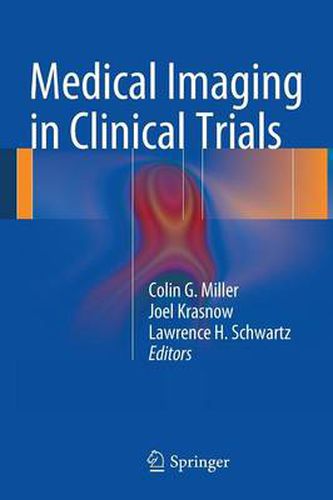Readings Newsletter
Become a Readings Member to make your shopping experience even easier.
Sign in or sign up for free!
You’re not far away from qualifying for FREE standard shipping within Australia
You’ve qualified for FREE standard shipping within Australia
The cart is loading…






This title is printed to order. This book may have been self-published. If so, we cannot guarantee the quality of the content. In the main most books will have gone through the editing process however some may not. We therefore suggest that you be aware of this before ordering this book. If in doubt check either the author or publisher’s details as we are unable to accept any returns unless they are faulty. Please contact us if you have any questions.
In the last few years the use of medical imaging has increased exponentially in routine clinical practice. This has been reflected in a rapidly increasing use of medical imaging in clinical trials, through all phases. More recently this has culminated in a number of inter-disciplinary meetings with the various stake holders, including the FDA. Changes in the regulatory process has resulted, when it comes to the submission of data to the FDA, in a therapeutic agent where one or more of the trial end-points is the assessment of a radiological end-point. No longer is it sufficient to have the images read by the local investigator site.
The FDA has also identified Medical Imaging as one of the key 6 points in the Critical Path initiative which was launched in 2004. This puts a keen focus on the role of imaging and the need to clearly identify and understand this aspect of clinical trials.
As the pharmaceutical, biotech and medical device industry continues to identify ways to improve and speed up product development, medical imaging plays a more significant role. An understanding of the methodology and the metrics is therefore required but difficult to ascertain in one easy to read volume for individuals entering this field. This book will therefore fulfill this void, be it for the pharmaceutical personnel from medical director to monitor, or the Principal Investigator who is having to understand the complexities of the imaging and why it is having to be sent off-site for a ‘central read.
$9.00 standard shipping within Australia
FREE standard shipping within Australia for orders over $100.00
Express & International shipping calculated at checkout
This title is printed to order. This book may have been self-published. If so, we cannot guarantee the quality of the content. In the main most books will have gone through the editing process however some may not. We therefore suggest that you be aware of this before ordering this book. If in doubt check either the author or publisher’s details as we are unable to accept any returns unless they are faulty. Please contact us if you have any questions.
In the last few years the use of medical imaging has increased exponentially in routine clinical practice. This has been reflected in a rapidly increasing use of medical imaging in clinical trials, through all phases. More recently this has culminated in a number of inter-disciplinary meetings with the various stake holders, including the FDA. Changes in the regulatory process has resulted, when it comes to the submission of data to the FDA, in a therapeutic agent where one or more of the trial end-points is the assessment of a radiological end-point. No longer is it sufficient to have the images read by the local investigator site.
The FDA has also identified Medical Imaging as one of the key 6 points in the Critical Path initiative which was launched in 2004. This puts a keen focus on the role of imaging and the need to clearly identify and understand this aspect of clinical trials.
As the pharmaceutical, biotech and medical device industry continues to identify ways to improve and speed up product development, medical imaging plays a more significant role. An understanding of the methodology and the metrics is therefore required but difficult to ascertain in one easy to read volume for individuals entering this field. This book will therefore fulfill this void, be it for the pharmaceutical personnel from medical director to monitor, or the Principal Investigator who is having to understand the complexities of the imaging and why it is having to be sent off-site for a ‘central read.